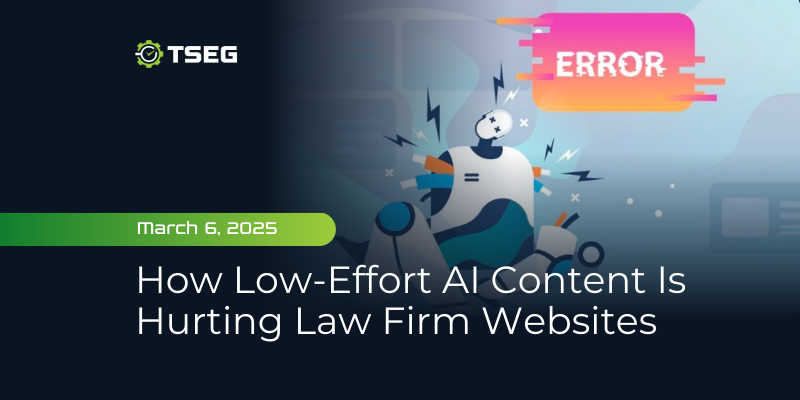How Low-Effort AI Content Is Hurting Law Firm Websites
Posted on Thursday, March 6th, 2025 at 2:28 pm
The Hidden Problem with AI-Generated Legal Content
Law firms rely on content marketing to build trust, educate potential clients, and improve their search rankings. But with AI-generated content flooding the internet, many firms may unknowingly publish content that looks polished but lacks real substance.
Some marketing providers use AI tools to churn out legal content in bulk with minimal oversight, prioritizing speed and cost over quality and value. This results in articles and website pages that read well at first glance – but ultimately fail to offer truly meaningful insights or real legal expertise from your law firm.
Google claims that its algorithm prioritizes content that actually provides genuine value – and recently has pushed out updates that aim to reduce the amount of AI generated content that just clutters its search results. If your law firm’s website is regularly posting generic AI-generated articles, potential clients will likely find them unhelpful, lose trust in your brand, and Google may rank your site lower in search results if it detects AI content.
To maintain credibility and search visibility, law firms must be vigilant about the content published on their websites. AI can be a helpful tool, but without human oversight, it can do more harm than good.
Google’s Stance
Google has made it clear that content must offer real value, not just look good. Yet some marketing providers argue that as long as AI-generated content appears professional and polished, it’s “good enough.” Google’s John Mueller directly countered this mindset:
“I struggle with the ‘but our low-effort work actually looks good’ comments. Realistically, cheap & fast will reign when it comes to mass content production, so none of this is going away anytime soon, probably never. ‘Low-effort, but good’ is still low-effort.”
This reinforces that Google isn’t just looking for proper grammar and clean-cut formatting—it evaluates whether content demonstrates expertise, provides unique insights, and truly helps readers. If an article is written quickly with minimal effort, no matter how polished it appears, don’t expect for it to perform well in rankings.
For law firms, relying on low-quality AI-generated content can be a costly mistake. While it may seem like an easy way to fill a blog or practice area page, it won’t drive meaningful, high quality traffic or establish credibility with your potential clients. Tools like ChatGPT, Gemini and DeepSeek have their pros and cons – but they make it clear that the outputs should not be accepted as 100% true.

How Low-Quality AI Content Hurts Law Firms
Publishing AI-generated content without a proper oversight system in place can harm a law firm’s online presence in multiple ways:
-
SEO Impact – For years, SEO’s have emphasized that Google’s search algorithms prioritize content that demonstrates expertise, authority, and trust (E-A-T). Not long ago, leaked documents about Google’s algorithm revealed something the AGC score (Artificially Generated Content) designed to identify and manage content generated through automated means. This score is part of Google’s broader effort to maintain the quality and integrity of its search results. AI-generated content that lack an attorney’s depth of knowledge or some form of originality often fail to meet these standards and can be detected by Google, leading to lower rankings and reduced visibility.
-
Client Trust – Visitors expect accurate and insightful legal information. If the content feels generic, sounds robotic or disconnected from real legal practice, they may question the firm’s credibility. A blog filled with surface-level AI-generated articles does little to differentiate a firm from its competitors. On top of Google cracking down on filtering out AGC, users are increasingly losing trust in search results if all the top links are just rewording the same exact content.
-
Engagement Decline – Well-written, informative articles keep readers on a site longer and encourage them to take action. AI-generated filler content, however, often fails to hold attention as people begin to recognize AI writing patterns, leading to higher bounce rates and missed opportunities for client engagement. Read our guide on humanizing AI content for law firms in our blog post here.
While AI has its place in content creation, relying too heavily on it without human review will likely create more problems than it solves. Law firms that focus on quality over sheer volume will see stronger results in search rankings, client trust, and overall online visibility.
The Solution: Quality Control & Human Oversight
In short, law firms need to be careful letting their content writing teams let AI tools run 100% of their content plans—especially in a field as complex as law. To maintain reputation and search rankings, law firms should adopt a content strategy that takes extra measures to ensure quality and accuracy.
Review every piece of content before publishing. A law firm’s website reflects its expertise and credibility. If a marketing provider is handling content creation, attorneys should work with them to implement a system that carefully reviews each piece, guaranteeing that it aligns with their professional standards.
Use AI as an assistant, not a replacement. AI can help with research and drafting, but the final human touch is essential. A legal professional should refine the content to ensure accuracy, add depth, and provide clarity—things AI alone cannot guarantee.
Partner with experts in legal marketing. Not all marketing agencies uphold the value and importance of legal content. Law firms should work with trusted specialists who prioritize high-quality, well-researched writing rather than mass-producing AI-generated material to fill content orders or meet deadlines.
BONUS: For more insights on using AI effectively in legal marketing, check out our guide to humanizing AI.

Don’t Let AI Generate A Bad Reputation For Your Firm
A law firm’s website should showcase unquestionable expertise, not just optimize for algorithms. While AI-generated content may seem like a quick and inexpensive solution, it often lacks the true value lawyers can offer to attract and convert potential clients. Google has made it very clear that low-effort content—no matter how polished it looks—won’t perform well in search rankings.
Lawyers should be especially wary of marketing providers who push AI content without human review. If an agency offers fast and cheap AI-generated content with no human intervention, it’s a warning sign that requires your immediate attention. A firm’s online presence should be built on well-researched, thoughtful content that reflects its legal knowledge and professionalism.
At TSEG, we specialize in legal marketing that goes beyond quick fixes and generic content. Our team understands what it takes to create high-quality, search-optimized and human-reviewed content that enhances a firm’s credibility and drives real client engagement. Taking the time to review content before publishing, using AI as a starting point rather than a shortcut, and working with experienced legal marketers can make all the difference. Though cheap, mass-produced content might seem convenient now, in the long run, it can cost far more in lost credibility and missed client opportunities. Reach out to TSEG for more info on today’s best content marketing practices.
